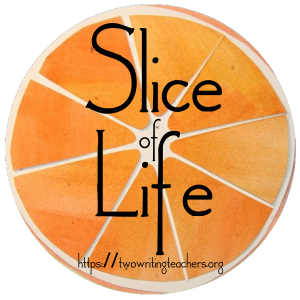“I work not by writing but by rewriting. Each sentence has many drafts. Eventually there is a paragraph. This gets many drafts. Eventually there is a page. This gets many drafts.”
William Gass, from Don Murray’s Shoptalk: Learning to Write with Writers
(Boynton/Cook Publishers Inc., 1990)
This morning I felt stuck, particularly with one of the essays that I have been working on. Below are a few things I did as a writer to keep moving forward on my writing:
- I studied published examples of essays. I had these two books at home: Small Wonder by Barbara Kingsolver (Harper Perennial, 2002) and The Wrong Way to Save Your Life by Megan Stielstra (Harper Perennial, 2017). These are not books that have anything to do with education or even close to the topics that I am writing about, but that doesn’t matter to me. I just needed to see some samples of how the authors began and ended their essays.
| Mentor texts I had handy at home |
- It was helpful for me to read my writing out loud. My family was still sleeping (and truthfully probably would not have been patient to give me good feedback anyhow), so I ended up reading one of my essays to my puppy, Hondo. Okay, so Hondo fell asleep as I was reading my work to him, but the important part was that I listened to how my writing sounded. I changed sentences that I didn’t like and ended up changing the order of a few paragraphs.
| My dog Hondo as I read to him |
- In writing all three of my essays, I am certain that I spent more time rereading, rewriting, and simply playing with the order of my paragraphs and word choice than I spent on actually writing each piece. I tend to do most of my editing and revising on the computer, but when I print it off, it is not pretty. I write messy notes in the margins, I often have sticky notes peeking out from drafts, and sometimes I write myself questions and reminders.
| See all of my messy notes? |
- Sometimes writing the beginning of a piece of writing is where I get stuck, as if the beginning magically determines the effectiveness of the whole piece. The essay that I was working on this morning was no exception. I wrote the body of the essay first and determined the heart of what I wanted to say before I wrote the beginning. When I got to the beginning, I wrote three different openings and selected the best one that I liked.
- I cringe when I think that I used to require that my students follow the steps in the writing process (in order!): prewriting/brainstorming, drafting, revising, editing, and publishing. I had beautiful, laminated posters that hung in my classroom. I thought that I was SO smart about teaching students the process of writing (and how these linear steps could be helpful to them), but I was incredibly misguided about this. As a writer, my process isn’t linear at all. It is all so tangled - a giant mess.
- When I feel hopelessly stumped, I stop writing and take one of my dogs for a walk. (Both my dogs love this the best.) As I walk, I think about what I am trying to do as a writer. This doesn’t always work, but often I think of different ideas/insights to weave into my writing. Today is incredibly cold in Wisconsin (think -5 degrees Fahrenheit when I awoke), but even a walk around the block helped me today.
Typically, many of my students believe that writing is a oneanddone affair, almost like on-demand writing. At times, I confess, I am guilty of showing my students how I begin a piece of writing, I lead a few mini lessons, and then present the polished result, but I am not sure that I always provide an accurate portrayal of the mess that going into my writing. The moves I made as a writer (yes, the messy ones) are the ones that I want to remember to share with my students the next time we are working on any kind of writing.
Again, I am reminded how challenging writing can be, especially when it is for something important. I've felt insecure in my writing and wanted to give up so many times in the last few days. I don't think that I talk about this part enough with my students.



No comments:
Post a Comment